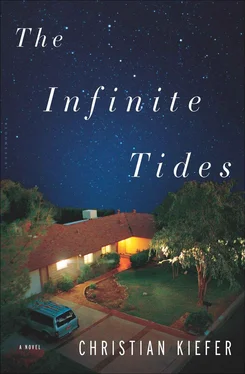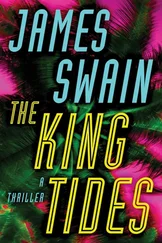By the time he reached junior high school, he had learned that he had an ability that his peers lacked, for the numeric relationships he intuitively understood had made the numbers akin to friends. But perhaps even more than that, in the burning and disconsolate sexuality of his young self the numbers provided a sense of intimacy. He would not have identified it as sexual — in fact would have denied this with a vehemence fraught with embarrassment — but there was no other word to describe the clear and secret detail in which he knew and understood them. The numbers and symbols and functions were beings unto themselves and while they were often represented as stark and concrete and unchangeable forms in textbooks and on chalkboards, he never saw them that way. Even as a child, he could see them the way he believed they actually were: as part of the three-dimensional space in which they existed as genuine and independent objects that were not alive and yet were possessed of all the manifest and unmistakable indicators of that state of being, of life itself. He could see the relationships between them and could hold those individual relationships in his mind, as if they had become physical structures which floated within an infinite empty container, and he could zoom into or out of those structures as if possessed of some enormous and all-encompassing lens. Entire equations could be worked out that way: solved a piece at a time by developing the relationships between sections, for in the end they were not even equations but rather collections of personalities that could be classified and understood the way one might understand the structure of a family: in conflict or harmony or some state between and their solutions the logical endpoint of those relationships.
The strength of that feeling faded with time, replaced later with a simpler and no less profound sense of familiarity. He did not think of them as having personalities now, although he could still see their colors. Instead, what he had felt about them as a child had given way to the sense that they were actively functional and representational. And yet even now he could feel them slotting into their locations with grace, perhaps even with longing, because they needed to complete their tasks. He had learned that much from them. He owed them that much. That was why he had chosen to become an astronaut, had worked toward that singular goal for so many years, because he owed the numbers for everything he was and anything less than pushing the practical limits of human knowledge would have been a betrayal of that trust. He never could have put this obligation into words and, if pressed, likely would have denied that any obligation existed at all and yet it was there nonetheless, a kind of counterweight to balance those things he would never understand. That was his gift and it was his obligation.
Even so many years later when he was alone in the empty house in the weeks and months after Barb had left him and Quinn had gone into the ground, after everything he had come to think of as having permanence had disappeared from his grasp, did the numbers not remain? In the chaos of everything that had come, did they not remain his constant companions even in the endless gloaming of his days in the cul-de-sac? The numbers were clear and precise and when he aligned them they told the truth, always, without question or innuendo and that truth had provided a path for him to follow. He had thought that Quinn could follow much the same path. That she could be like he was. That she could be just like he was.
He called Barb right before Quinn went to bed and they spoke briefly and then he handed the phone to Quinn and said, “Tell Mommy good night,” and instead Quinn said, “Daddy says Grandpa is going to die.” Again he told her to say good night and this time she did so. He took the phone back without comment and said, “We miss you.”
“What in god’s name did you tell her?” she said.
“I told her the truth,” he said, and when she did not respond he said, “I thought she needed to know what was going on. She misses you.”
“I miss her too,” she said. “I miss you both.”
“We can come out there,” he said. “If you need us to.”
“There’s no reason to do that. It’ll just upset Quinn.”
“She can handle it,” he said.
She did not respond. In the silence, he wanted to somehow tell her that he had learned something about their daughter, that she had a gift, but he could think no way to express that now. He could find no words.
They talked for a few minutes longer and then he said good-bye and hung up the phone and looked to Quinn. “You know, that’s not a nice thing to say,” he said to her.
Quinn was seated on the bed in her pajamas. “What isn’t?” she said.
“Telling Mommy that I said Grandpa’s going to die.”
“But he is going to die.”
“She already knows that.”
“But she didn’t know that I know that.”
“That’s true,” he said. Then: “It’s time for bed.”
“Can we watch another show?”
“No.”
She was looking at him as if getting ready to make another request but instead she simply said, “OK,” and let him tuck her into bed and kiss her good night and when she lay there, at last under the covers, he said, “How long have you known that four was red?”
“Brownish red,” she said.
“OK, brownish red, then. How long have you known?”
“It’s always brownish red.”
“Did you know that almost nobody can see that?”
“What do you mean?”
“Only special people can see the colors.”
“Well, that doesn’t seem fair,” she said.
He smiled. “No, I guess not but it’s true.”
“If they don’t have colors then what color are they?”
“Just black. Like words in a book.”
“Oh,” she said. “That seems dumb.”
“Yes,” he said, “yes, it does.” He continued to look at her. “I can see the colors too,” he said. “And I know they have feelings.”
“Good,” she said.
“I don’t know anyone else who can,” he said. “Just you and me.”
“Really?”
“Really.”
“Cool.”
“Yeah, cool. You’re going to do great things, Quinny.”
“So are you, Dad,” she said.
He smiled again. “Yes, I am,” he said, still smiling. “You and me.” He paused a moment and then said, “Good night.”
“Good night, Daddy,” she said.
He rose and turned the light off and closed the door halfway but he did not get much farther than the hallway because she immediately called him back with a loud, “Daddy!” and he turned and reopened the door and found her sitting up in bed with tears streaming down her cheeks.
“What’s wrong?” he said. He had already crossed the room to take her in his arms and crush her body against his own. She said something in response to his question, something choked through tears that he could not understand, so he asked her again and this time she said, more clearly, “I don’t want Grandpa to die.”
“Oh,” he said, “I don’t either.”
“I can’t stop thinking about it.”
“I know.”
“Can we go see him?”
“We can’t do that now.”
“Why not?”
“Because we can’t.”
She continued to weep against his chest and he held her until she grew quiet in that dark room. Until everything grew so very quiet. Until she had fallen asleep at last.
The following day was Friday and he thought he might need to keep her home from school but when he offered this as an option she looked at him quizzically and told him that she was not sick. When he told her that sometimes people just needed to stay home and rest even if they felt fine she told him that was a silly thing to say and that she needed to go to school. He thought that he should probably keep her home anyway, that Barb would have kept her home, but he had no real plan of what he would do with her for those hours of the day and so he helped her get ready and made her lunch based on Barb’s carefully worded instructions (“Mayo: Not too much!”).
Читать дальше












